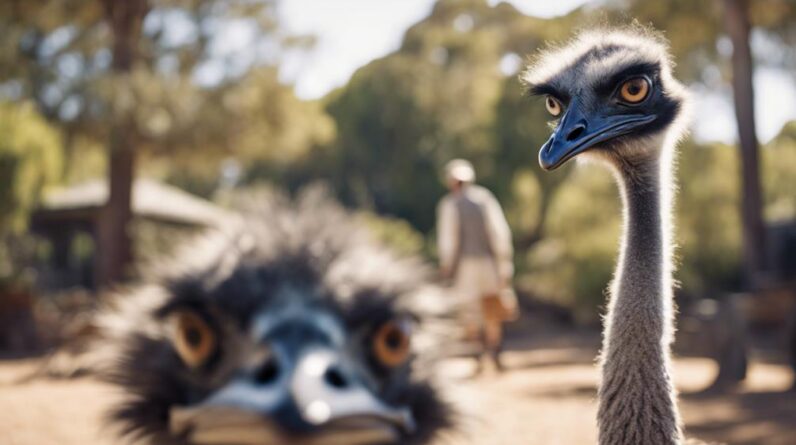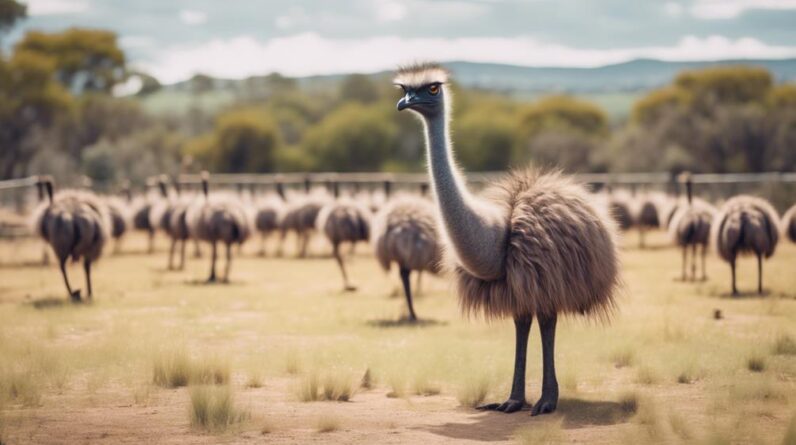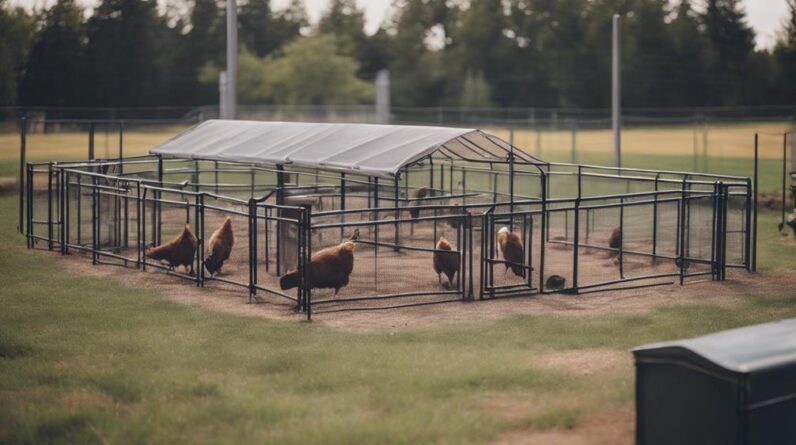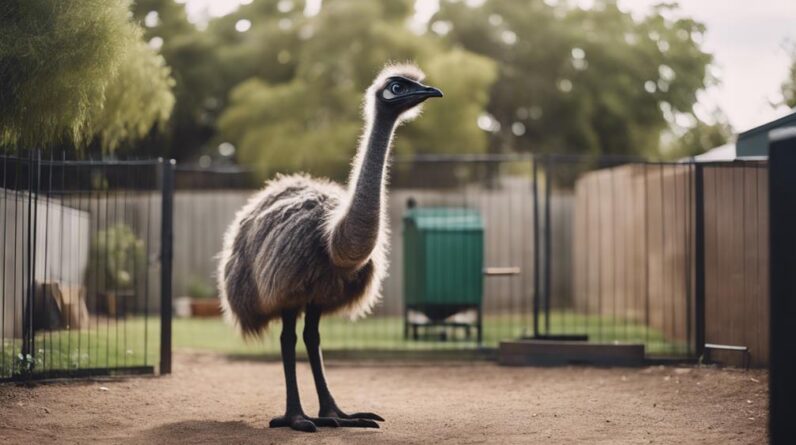
Did you know that emus are not just fascinating creatures in the wild but can also make surprisingly affectionate pets? Their quirky personalities and social nature might intrigue you, but there are some aspects to consider before taking the plunge into emu ownership. From their unique physical characteristics to the challenges of meeting their specific care needs, exploring the pros and cons of having an emu as a pet can shed light on whether these majestic birds are the right fit for you.
Key Takeaways
- Emus are friendly, sociable, and form strong bonds with humans.
- They are intelligent, trainable, and enjoy activities like walks and games.
- Emus require large outdoor spaces, can be territorial, and need shelter.
- Understanding regulations, permits, and financial costs is crucial for responsible ownership.
- Emus communicate through vocalizations, have unique reproductive habits, and a lifespan of 10-20 years.
Emus' Friendly and Sociable Nature
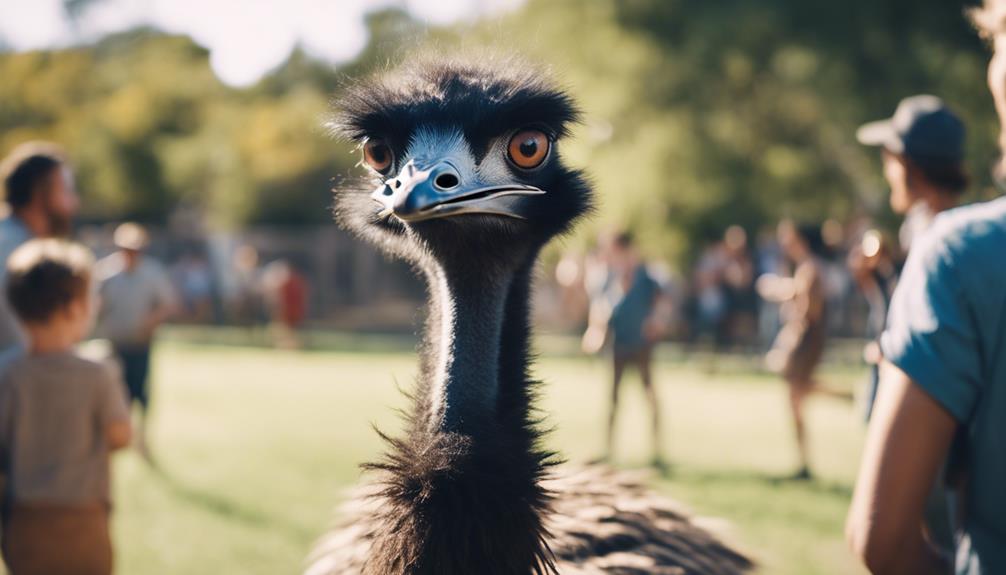
When considering emus as pets, their friendly and sociable nature can be a significant factor in your decision-making process. Emus are known to form strong bonds with their human caregivers, often seeking out interaction and companionship. This can create a rewarding experience for pet owners who value connection and social engagement with their animals. Emus have a curious and intelligent demeanor, making them responsive to training and capable of learning various commands. Their friendly disposition also makes them well-suited for activities such as walks or simple games, enhancing the bond between you and your pet.
However, it's essential to remember that emus, like any other animal, have individual personalities, and not all may exhibit the same level of sociability. Some emus may be more reserved or independent, requiring patience and understanding from their owners. Additionally, their sociable nature means that they thrive in environments where they can interact with other animals or even fellow emus. Providing adequate socialization opportunities is crucial to ensuring the well-being of your emu pet.
Unique Physical Appearance and Characteristics
Emus possess distinctive physical characteristics that set them apart from other common household pets, making them intriguing additions to your animal companions. These flightless birds stand tall, reaching up to 6.2 feet in height, with a striking long neck and powerful legs that allow them to run at speeds of up to 30 miles per hour. Their soft, dense feathers range in color from brown to gray, providing them with excellent insulation in both hot and cold climates. Emus have small, beady eyes that convey a sense of curiosity and intelligence, adding to their charm.
One of the most unique features of emus is their ability to communicate through deep grunts, drumming sounds, and booming calls that can be heard from a distance. Their adaptability to various environments and their agile movements make them fascinating creatures to observe. However, their territorial nature and occasional aggression, especially during mating season, require careful handling and understanding. Emus can be a captivating and visually striking addition to your household, but they also demand respect and proper care to thrive in a domestic setting.
Potential for Bonding and Companionship
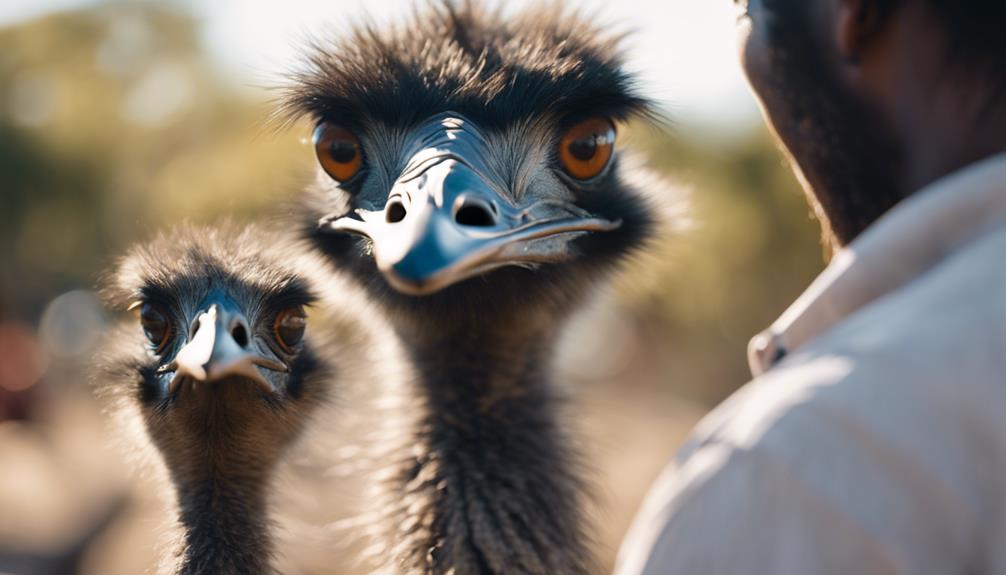
In considering the potential for bonding and companionship with emus, it's important to understand their social behavior and interactions within a domestic setting. Emus are highly social animals that can form strong bonds with their human caregivers if raised from a young age. They're known to recognize individuals and show affection through gentle pecking and vocalizations. Emus have a curious nature and may enjoy following you around the yard or even sitting near you during quiet moments.
However, it's crucial to note that emus, while capable of forming bonds, have their own unique way of expressing companionship. They may not seek constant physical affection like a traditional pet such as a dog or cat. Emus prefer interactions on their terms, and understanding their body language is key to developing a strong bond with these majestic birds.
Emus' Low Maintenance Requirements
With their relatively low maintenance requirements, caring for emus can be a manageable task for responsible pet owners. Emus are hardy birds that can adapt well to various climates, requiring minimal grooming compared to other pets. Providing a spacious outdoor area for them to roam freely and get exercise is essential.
Their diet mainly consists of grains, fruits, and vegetables, making feeding them straightforward and cost-effective. Emus are generally healthy animals that don't require frequent visits to the vet if provided with a proper diet and environment. Checking their enclosure for safety and ensuring they have access to clean water is crucial for their well-being.
Emus are social creatures that thrive with companionship, so having at least one other emu is recommended to prevent loneliness and promote their mental health. Overall, with a suitable living space, a balanced diet, and some companionship, meeting an emu's low maintenance needs can be a rewarding experience for pet owners willing to commit to their care.
Challenges of Housing and Space Needs
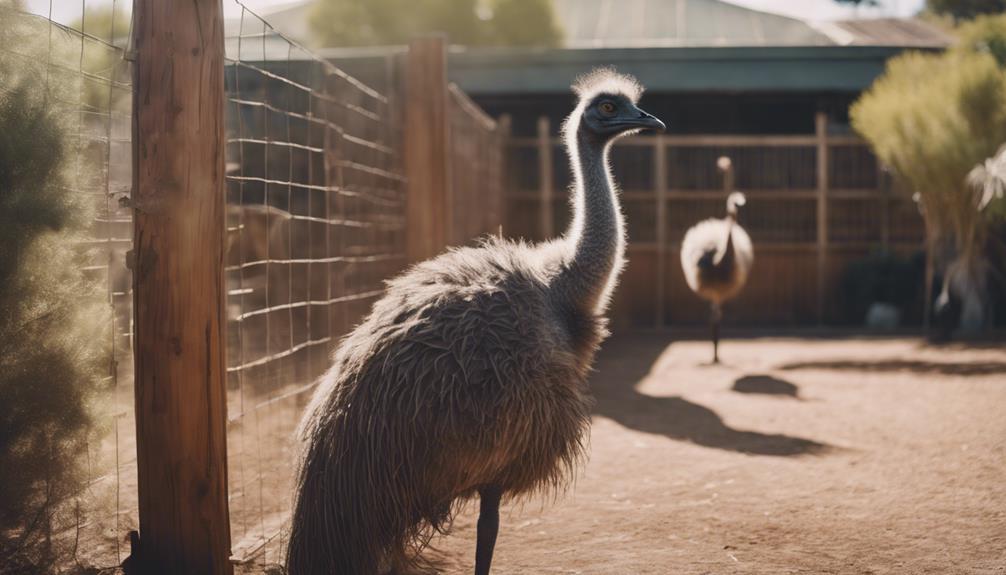
Considering the challenges of housing and space needs when caring for emus as pets, it is crucial to provide ample room for these birds to roam and exercise freely. Emus are large, flightless birds that require a significant amount of space to thrive. A lack of space can lead to stress, health issues, and even aggression in these animals. To ensure the well-being of your pet emu, it is essential to create a suitable living environment that meets their space requirements.
| Challenges of Housing and Space Needs | ||
|---|---|---|
| Challenge | Description | Impact |
| Limited Space | Emus need a large outdoor area to roam and run. | Insufficient space can lead to stress and health problems. |
| Secure Enclosure | Emus are curious and can be escape artists. | Inadequate enclosures can result in emus escaping or getting injured. |
| Shelter | Emus require shelter from extreme weather conditions. | Lack of shelter can lead to discomfort and health issues. |
Properly addressing the housing and space needs of emus is crucial for their overall well-being and happiness.
Emus' Diet and Feeding Considerations
When caring for emus as pets, ensuring a proper diet and addressing feeding considerations is essential for their health and well-being. Emus are primarily herbivores, and their diet should consist of a balanced mix of high-quality emu pellets, fresh fruits, vegetables, and grains. Emus also need access to clean water at all times, as they drink frequently to aid digestion and regulate body temperature.
Consider feeding your emus twice a day, offering a set amount of food each time to prevent overeating. Monitoring their food intake is crucial, as obesity can lead to various health issues in emus. Additionally, providing access to grit or small stones is important for emus, as they use these items to aid in grinding food in their gizzard.
Consulting with a veterinarian or an emu expert can help you tailor a diet plan specific to your emus' needs. Remember, a well-balanced diet is key to keeping your emus healthy and thriving in a domestic setting.
Emus' Health and Veterinary Care
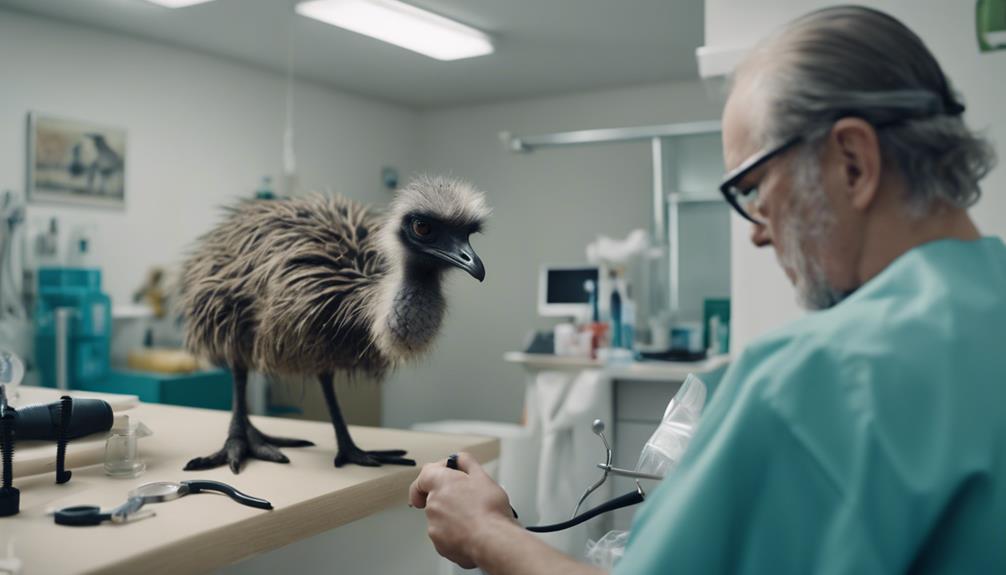
Proper healthcare and regular veterinary check-ups are crucial for ensuring the well-being of emus kept as pets. Emus require specialized care to thrive in captivity. Regular check-ups with an avian veterinarian are essential to monitor their health and address any potential issues promptly. Emus are susceptible to various health conditions, including parasites, fungal infections, and bumblefoot, which can impact their well-being if not treated promptly.
Routine vaccinations and parasite prevention measures are vital to keep your emus healthy. Additionally, providing a balanced diet, adequate space for exercise, and proper grooming can contribute to their overall health and well-being. It's important to observe your emus regularly for any signs of illness or distress, such as changes in behavior, appetite, or droppings.
In case of any health concerns, contacting a qualified avian veterinarian is crucial. They can provide guidance on proper care, treatment options, and preventive measures to ensure your emus lead a healthy and happy life in captivity. Regular veterinary care is key to maintaining the health and vitality of your emu companions.
Legal Regulations and Permit Requirements
To legally keep emus as pets, understanding the applicable regulations and obtaining necessary permits is vital for responsible ownership. In many regions, owning emus is subject to specific laws and permit requirements to ensure their welfare and the safety of the community. These regulations typically cover aspects such as enclosure size, diet, veterinary care, and transport guidelines. Before bringing an emu home, research your local laws or consult with authorities to determine the exact requirements for keeping emus as pets.
Permit requirements may vary depending on your location, so it's crucial to comply with the laws to avoid potential fines or legal issues. Some areas may mandate obtaining a special exotic animal permit, while others might require specific certifications or inspections. By adhering to these regulations, you not only demonstrate your commitment to responsible pet ownership but also contribute to the conservation and protection of emus in captivity. Remember that staying informed and following the legal procedures will make your experience of having an emu as a pet more enjoyable and fulfilling.
Emus' Vocalizations and Behavior
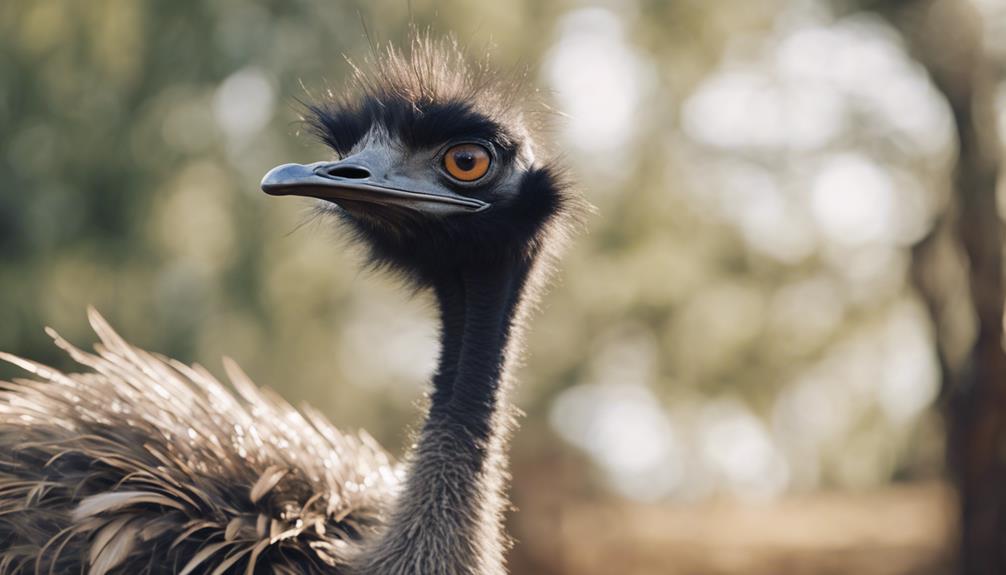
Emus occasionally communicate through a variety of vocalizations that play a significant role in their behavior and social interactions. These majestic birds produce deep, drum-like booming sounds that can carry over long distances, serving as a means of attracting mates or establishing territory. Additionally, emus emit loud grunts, hisses, and soft booming sounds to express emotions such as excitement, fear, or contentment. Understanding these vocal cues can help you interpret your pet emu's mood and needs, fostering a stronger bond between you and your feathered companion.
In terms of behavior, emus are highly social creatures that thrive in groups. They display a complex hierarchy within their flock, with dominant individuals asserting their authority through body language and vocalizations. As a pet owner, it's crucial to provide your emu with ample space to roam and interact with others of its kind to ensure its well-being and mental stimulation. By observing and respecting their natural behaviors, you can create a harmonious environment where your emu can flourish.
Emus' Egg Production and Reproduction
When it comes to understanding your pet emu more deeply, exploring their egg production and reproduction can provide valuable insights into their natural life cycle and behaviors. Female emus are the ones responsible for laying eggs, typically laying a clutch of around 20 eggs over a period of several weeks. The male emu is the one who takes on the role of incubating the eggs, showing dedication and care during this period which lasts about 8 weeks. Emus usually mate for life, forming strong bonds with their partners.
Emu eggs are known for their large size and vibrant green color, making them fascinating to observe. In the wild, emus build their nests on the ground using leaves and grass to cushion the eggs. Understanding the reproductive habits of emus can help you appreciate the intricate dynamics of these majestic birds and further strengthen the bond you have with your pet emu.
Emus' Lifespan and Long-Term Commitment
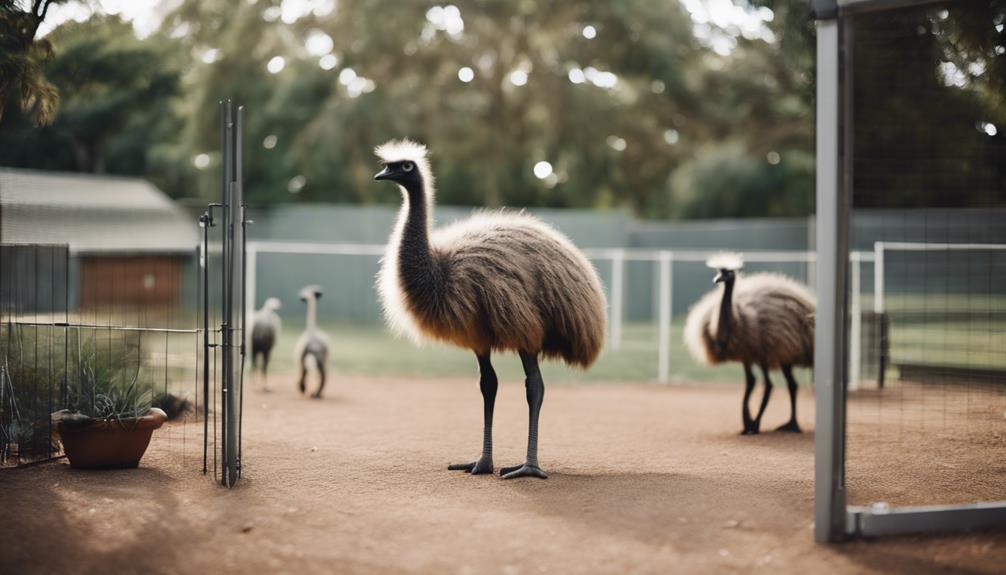
Considering the significant commitment involved, understanding the lifespan of emus can provide valuable insight into the long-term care required for these unique birds. Emus have a lifespan of around 10 to 20 years, with some individuals even living up to 35 years in captivity. This longevity means that deciding to keep an emu as a pet is a substantial long-term commitment that requires careful consideration.
Emus are social birds that form strong bonds with their human caregivers and other emus. Their need for companionship and interaction means that you must be prepared to dedicate time and effort to meet their social needs throughout their potentially lengthy lifespan. Additionally, emus can grow quite large, reaching up to 6 feet in height and weighing around 100 pounds. Providing adequate space, shelter, and enrichment for these sizable birds is crucial for their well-being and longevity.
Financial Costs and Budgeting for Emus
To properly care for emus as pets, it's essential to understand the financial costs involved and to develop a suitable budget for their upkeep. Emus can be expensive to care for due to their specific needs and requirements. Initially, you'll need to consider the cost of purchasing the emu, which can range from $100 to $500, depending on factors like age, health, and breed. Additionally, you'll need to invest in a suitable enclosure that provides ample space for them to roam and shelter from the elements. The cost of building or buying an appropriate enclosure can vary but may range from $500 to $2000 or more.
Moreover, you must budget for ongoing expenses such as high-quality emu feed, veterinary care, fencing maintenance, and other essentials. Emus consume a significant amount of food daily, so be prepared to allocate a substantial portion of your budget to feed them adequately. Veterinary care, including routine check-ups and emergency medical expenses, should also be factored into your financial planning. Overall, it's crucial to budget wisely and ensure that you can afford the long-term financial commitment of keeping emus as pets.
Frequently Asked Questions
Can Emus Be Trained to Perform Tricks or Tasks?
Yes, emus can be trained to perform tricks or tasks. They are intelligent birds that can learn commands and routines. With patience, consistency, and positive reinforcement, you can teach them various behaviors and skills.
Do Emus Get Along With Other Household Pets?
In a harmonious setting, emus can coexist with other household pets. They may establish unique relationships, like a diverse orchestra playing in sync. Proper introductions, supervision, and understanding of emu behavior are vital for peaceful companionship.
What Is the Average Noise Level of an Emu?
Emus can be noisy, emitting deep booming sounds that can carry over long distances. Their calls serve as communication and can be heard up to 2 miles away. Understanding their vocalizations is key to coexisting peacefully.
Are There Any Specific Toys or Enrichment Activities for Emus?
To keep emus engaged, provide toys like hanging feeders, balls, and mirrors. Enrichment activities include obstacle courses, foraging challenges, and sprinklers for cooling. Consider their safety and natural behaviors when choosing toys and activities.
How Do Emus React to Changes in Their Environment or Routine?
When faced with changes in their environment or routine, emus can exhibit stress by pacing, vocalizing, or becoming agitated. By gradually introducing alterations and maintaining consistency, you can help them adapt more easily.
Conclusion
In conclusion, owning an emu can be a rewarding experience filled with companionship and unique interactions. Just remember, while emus may seem low-maintenance, their territorial behavior and space requirements can be quite demanding.
So, if you're ready to commit to providing the care and attention these fascinating birds need, get ready for a journey filled with surprises and challenges. Embrace the quirks of your emu companion, and enjoy the adventure ahead!

